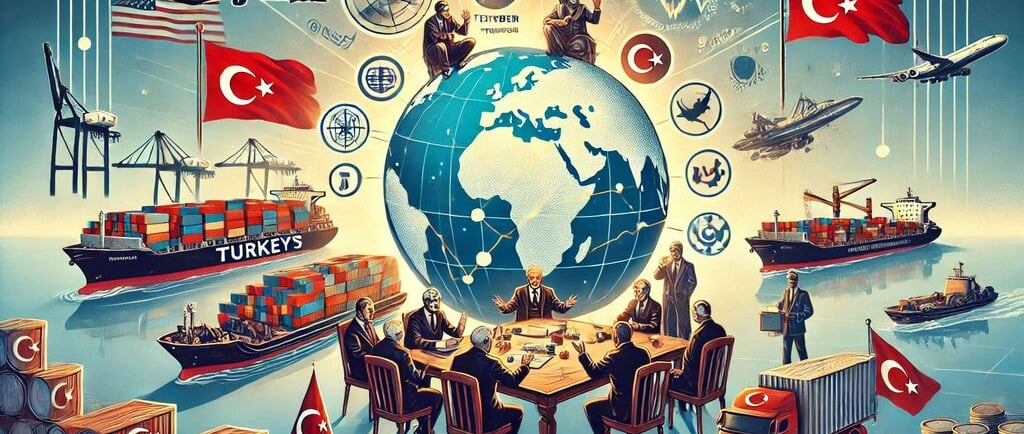Let us collaborate to foster global growth and development together.
Understanding Turkey’s Trade Agreements: What They Mean for Global Trade
Explore Turkey's trade agreements, their impact on global trade, and the opportunities they create for businesses navigating international markets.
TURKEY
10/31/20243 min read


Understanding Turkey’s Trade Agreements: What They Mean for Global Trade
Meta Description: Explore Turkey's trade agreements, their impact on global trade, and the opportunities they create for businesses navigating international markets.
In a rapidly globalizing world, trade agreements serve as crucial tools for fostering international collaboration and economic growth. Turkey, with its strategic location bridging Europe and Asia, plays a pivotal role in global trade. Its diverse network of trade agreements opens up a wealth of opportunities for businesses worldwide. But what exactly do these agreements entail, and how can they affect global trade dynamics?
The Importance of Turkey’s Strategic Location
Turkey is uniquely positioned at the crossroads of Europe, the Middle East, and Asia. This geographic advantage makes it an essential hub for trade, logistics, and global supply chains. Turkey’s government has capitalized on this location, pursuing a range of trade agreements that enhance its economic ties and market access.
For businesses, this means more efficient access to a wide range of markets across continents. From its close relations with the European Union (EU) to its free trade agreements (FTAs) with various nations, Turkey has built a robust trade ecosystem that benefits local and international businesses alike.
Key Trade Agreements Shaping Turkey’s Economy
Customs Union with the European Union
One of Turkey’s most significant trade arrangements is its Customs Union with the EU, in effect since 1996. This agreement covers industrial goods, eliminating tariffs and allowing duty-free exports between Turkey and EU member states.
For example, a Turkish automobile manufacturer can export to Germany without additional duties, while a French textile producer can import components from Turkey at a lower cost. However, this agreement doesn’t cover agriculture, services, or public procurement, which can limit its scope for businesses in these sectors.
Free Trade Agreements (FTAs)
Turkey has signed over 20 FTAs with countries ranging from South Korea to Morocco. These agreements reduce trade barriers, simplify customs procedures, and promote bilateral trade relations.
Some of Turkey’s notable FTAs include those with:
South Korea: Expanding trade in electronics, machinery, and vehicles.
United Kingdom: Ensuring continuity post-Brexit for industries like automotive and textiles.
Such agreements are essential for companies seeking to enter emerging markets or diversify their supply chains.
Participation in Global Trade Organizations
Turkey is a member of the World Trade Organization (WTO), advocating for fair trade practices and dispute resolution mechanisms. This membership aligns Turkey with global trade standards, fostering trust and transparency for international investors and partners.
Impacts on Global Trade
Enhancing Supply Chain Efficiency
Turkey’s trade agreements streamline supply chains, reducing transit times and lowering costs. Its Customs Union with the EU, for instance, simplifies logistics for European companies sourcing materials from Turkey.
Businesses in the automotive and textile industries are particularly well-positioned to benefit from these agreements. By leveraging Turkey as a manufacturing base or transit hub, companies can improve operational efficiency while accessing diverse markets.
Promoting Regional Stability
By fostering economic interdependence, Turkey’s trade agreements also contribute to regional stability. Partnerships with neighboring countries encourage collaborative growth, reduce economic disparities, and strengthen diplomatic ties. This creates a predictable and stable trade environment for global investors.
Challenges to Consider
Despite these advantages, businesses must navigate certain challenges. For instance, ongoing discussions about modernizing the Customs Union reveal gaps in areas like agriculture and e-commerce. Furthermore, geopolitical tensions can impact trade relations, particularly with countries in the Middle East.
How Businesses Can Capitalize on Turkey’s Trade Agreements
Evaluate the Benefits of FTAs
Companies should analyze how Turkey’s FTAs align with their industry goals. For instance, a tech company exporting to South Korea could benefit from reduced tariffs and expanded market access. Likewise, businesses targeting the UK can explore the new post-Brexit agreement for trade continuity.
Leverage Local Expertise
Collaborating with Turkish partners or consulting local trade experts can help businesses navigate regulatory requirements and cultural nuances. This is particularly beneficial for SMEs looking to enter Turkey’s vibrant market.
Adopt a Long-Term Strategy
To fully capitalize on Turkey’s trade agreements, companies should plan long-term strategies that align with evolving trade policies. Monitoring negotiations about modernizing the Customs Union, for example, can reveal new opportunities for growth.
Conclusion
Turkey’s trade agreements serve as a cornerstone of its economic strategy, fostering connections across Europe, Asia, and beyond. For businesses, understanding these agreements is the key to unlocking new opportunities in a globally competitive landscape.
By leveraging Turkey’s geographic advantages and comprehensive trade network, companies can improve supply chain efficiency, enter diverse markets, and contribute to a stable international trade environment.
What are your thoughts on Turkey’s trade agreements? Leave a comment below or explore our articles on supply chain optimization and emerging markets in global trade for more insights.
Innovation
Cutting-edge solutions for industrial efficiency and productivity.
© 2024. All rights reserved.


